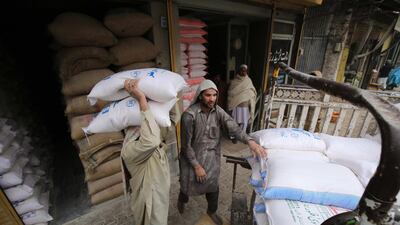The International Monetary Fund has reached an agreement with Pakistan that would allow the South Asian nation to access $450 million (Dh1.65 billion) of a $6bn bailout package.
The staff-level agreement is subject to approval by the IMF's management and board, which is expected by April, said Ernesto Rigo, the IMF's mission chief for Pakistan.
The multilateral lender in Washington approved a $6bn bailout in July to help Pakistan with its balance of payments crisis as it struggles with mounting liabilities. The country, which has a population of more than 208 million people, has seen its debt rise by 40 per cent over the past 15 months. Pakistan's total outstanding payments stood at 29.879 trillion Pakistani rupees (Dh711bn) at the end of 2018, with debt ballooning to 41.48tn rupees by the end of the third quarter of 2019, according to the Ministry of Finance.
Pakistan has struggled to replenish is dwindling foreign exchange reserves, which at one point fell to a level that was only sufficient to cover about two months of exports.
Last year, the government also failed to boost revenue to implement its ambitious economic reform agenda. It instead has resorted to increase taxes and duties, which has pushed prices higher.
The IMF package will support the Pakistan government's reform agenda as Islamabad tries to strengthen an economy with a large fiscal deficit and loose monetary policy. The IMF will release $2bn annually in phases to Islamabad under an extended fund facility. In return, the fund requires Pakistan to strengthen its tax revenue mobilisation, including the elimination of tax exemptions and loopholes as well as prudent expenditure policies.
Pakistan's banking system has also come under pressure with global watchdog Financial Action Task Force saying the country could be placed on a "grey list" if it does not strengthen its money laundering rules.
In December, Moody's Investors Service affirmed Pakistan's "B3" rating and revised its outlook to stable from negative. The credit rating agency changed its view as it expects Pakistan’s balance of payments to improve on the back of fiscal policy reforms and currency flexibility.
S&P slashed the country's rating last year to six notches below investment grade to B- from B citing diminishing growth prospects and elevated fiscal and external factors.
Pakistan's economy is projected to decelerate to 3.3 per cent in 2019 and 2.4 per cent in 2020, from 5.5 per cent in 2018, according to the IMF.


